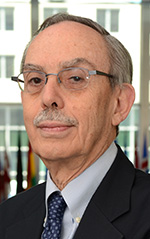Public Diplomacy: Re-engaging the World
Eight steps to rebuild U.S. credibility as a world leader and a society worthy of emulation.
BY SHERRY L. MUELLER AND JOEL A. FISCHMAN
While international faith in America’s global leadership is much diminished, there is residual affinity around the world for our values, goals and democratic heritage. The Biden-Harris administration faces many global challenges and will need to reinvent and revitalize the instruments of American statecraft. In this connected age, the public dimension of U.S. global leadership will be decisive, because publics abroad are indispensable players in policy.
As it restores America’s global relationships, the new administration should emphatically embrace U.S. public diplomacy (PD). Through purposeful interactions with foreign publics, public diplomacy conveys American values and helps our leaders understand the range and roots of global opinion. It provides tools and platforms to rebuild critical relationships through effective programs and dialogues that build trust.
We respectfully recommend that the administration invest considerable thought and resources to reinvigorate U.S. public diplomacy within the State Department. Here are the priorities:
Build consistent leadership. Appoint a respected under secretary for public diplomacy and public affairs who (1) understands both foreign policy and communication, (2) can navigate the department and the interagency environment, (3) enjoys the evident confidence of the president and the Secretary of State and (4) intends to stay in the job. After the Secretary of State, this is the second most important appointment in the State Department.
Open doors. Eliminate recently erected barriers to international education and exchanges, notably the proposed federal rulemaking on “duration of status” that would have an enormously negative impact on U.S. higher education, and the June 22, 2020, White House proclamation halting issuance of several categories of nonimmigrant visas. America’s academic and business communities will be vocal allies on these issues.
Coordinate international communication. Strengthen the Department of State’s strategic public diplomacy planning and support for major global policy initiatives (e.g., managing the pandemic, climate change). The Bureau of Global Public Affairs is best positioned to manage substantive development of international public communication together with regional and functional bureaus within the State Department and relevant interagency representatives.
Reinvigorate and update public diplomacy staff training.
Engage the American public. The American people, and especially our youth, are the president’s finest diplomats. Devise programs on compelling topics (e.g., climate, race, public health, the arts) that involve both travel and an ongoing virtual component. Long-term U.S. interests will be served by encouraging more young Americans to engage with the world.
Restore broadcasting. Restore protections for U.S.-funded international broadcasting against politicization, enabling it to perform its true function: to inform, engage and connect people around the world in support of freedom and democracy.
Expand counter-disinformation efforts. Attacked by propaganda on steroids, America has fought back with aspirin. There is a pressing need to: coordinate the Global Engagement Center and public diplomacy’s social media work with the intelligence community and Department of Defense information operations; fully document hostile disinformation efforts mounted by foreign governments; and assist nongovernmental organizations and the private sector to inoculate susceptible groups and individuals against the appeals of national adversaries and violent extremists.
Enhance professional culture. Reinvigorate and update public diplomacy staff training, including opportunities to pursue advanced degrees and “excursion tours” in the private sector. More PD training should be provided to all department officers. These expanded opportunities will attract talented officers.
Augment resources. To fuel this process of more effectively engaging with the world, reenergizing the public diplomacy function and attracting top talent, substantially increase resources for all elements of PD, and reinforce the “firewall” that protects exchange funding. Part of this effort should be a review of PD staffing abroad that assesses the potential need for expanded presence.
Read More...
- “Rethinking Public Diplomacy for a Post-Pandemic World,” by Jian “Jay” Wang, The Foreign Service Journal, July-August 2020
- “A Strategic Approach to Public Diplomacy,” by Joe B. Johnson, The Foreign Service Journal, May 2015
- “Proving Public Diplomacy Programs Work,” by James Rider, The Foreign Service Journal, December 2015



